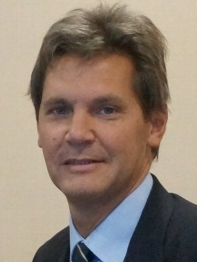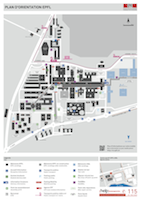Go to
Enrico Macii
 Professor
Professor
Department of Computer Engineering
Vice Rector for Research
Politecnico di Torino, Itay
Viable Paths Towards Graphene Circuits: Implementation Styles and Logic Synthesis Tools
Friday, 11 December 2015 at 11:20 in room BC 420
Abstract:
Due to its unique structure, graphene shows astounding electrical properties (e.g., high mobility), combined with unique mechanical characteristics, like transparency and stretchability. These features make this material a potential vehicle for highly scaled flexible ICs.
Unfortunately, pristine graphene is a semimetal rather than a semiconductor and it cannot be used, as is, to implement FETs. While most of the current research activities are facing the problem of opening a band-gap by means of invasive chemical process, we are addressing this issue from a different angle, that is, by introducing efficient integration strategies that exploit the intrinsic properties of the material, rather than trying to modifying them.
Aim of this talk is to present our recent achievements in this field and, in particular, to show a new implementation style for all-graphene logic circuits. The proposed circuit solution, together with a dedicated logic synthesis flow that better exploits the high expressive power made available by brand-new graphene logic primitives, has superlative power/delay figures that perfectly match the requirements of ultra-low power applications.
About the speaker:
Enrico Macii was born in Torino, Italy, on February 7, 1966. He is a Full Professor of Computer Engineering at Politecnico di Torino. Prior to that, he was an Associate Professor (from 1998 to 2001) and an Assistant Professor (from 1993 to 1998) at the same institution. From 1991 to 1997 he was also an Adjunct Faculty at the University of Colorado at Boulder. He holds a Laurea Degree in Electrical Engineering from Politecnico di Torino (1990), a Laurea Degree in Computer Science from Università di Torino (1991) and a PhD degree in Computer Engineering from Politecnico di Torino (1995). Since 2007, he is the Vice Rector for Research at Politecnico di Torino; he was also the Rector’s Delegate for Technology Transfer (2009-2015) and for International Affairs (2012-2015).
His research interests are in the design of electronic digital circuits and systems, with particular emphasis on low-power consumption aspects. In the last few years, he has extended his research activities to the broad area of bioinformatics, providing algorithmic contributions, adapted and/or extended from the circuit design research sector, to new image processing techniques and various types of data analyses for different applications in the biomedical domain. Finally, he has been growingly involved in projects focusing on the development of new technologies, methodologies and policies for achieving energy efficiency in buildings, districts and cities, therefore addressing multi-disciplinary activities regarding clean energy deployment, low-pollution mobility, sustainable urban development, pointing towards the actuation of the concept of smart city.
Secondary navigation
- EPFL Workshop on Logic Synthesis and Emerging Technologies
- Luca Amaru
- Luca Benini
- Giovanni De Micheli
- Srini Devadas
- Antun Domic
- Rolf Drechsler
- Pierre-Emmanuel Gaillardon
- Jie-Hong Roland Jiang
- Akash Kumar
- Shahar Kvatinsky
- Yusuf Leblebici
- Shin-ichi Minato
- Alan Mishchenko
- Vijaykrishnan Narayanan
- Ian O'Connor
- Andre Inacio Reis
- Martin Roetteler
- Julien Ryckaert
- Mathias Soeken
- Christof Teuscher
- Zhiru Zhang
- Symposium on Emerging Trends in Computing
- Layout synthesis: A golden DA topic
- EPFL Workshop on Logic Synthesis & Verification
- Luca Amaru
- Luca Benini
- Robert Brayton
- Maciej Ciesielski
- Valentina Ciriani
- Jovanka Ciric-Vujkovic
- Jason Cong
- Jordi Cortadella
- Giovanni De Micheli
- Antun Domic
- Rolf Drechsler
- Henri Fraisse
- Paolo Ienne
- Viktor Kuncak
- Enrico Macii
- Igor Markov
- Steven M. Nowick
- Tsutomu Sasao
- Alena Simalatsar
- Leon Stok
- Dirk Stroobandt
- Tiziano Villa
- Symposium on Emerging Trends in Electronics
- Raul Camposano
- Anantha Chandrakasan
- Jo De Boeck
- Gerhard Fettweis
- Steve Furber
- Philippe Magarshack
- Takayasu Sakurai
- Alberto Sangiovanni-Vincentelli
- Ken Shepard
- VENUE
- Panel on Circuits in Emerging Nanotechnologies
- Panel on Emerging Methods of Computing
- Panel on The Role of Universities in the Emerging ICT World
- Panel on Design Challenges Ahead
- Panel on Alternative Use of Silicon
- Nano-Bio Technologies for Lab-on-Chip
- Functionality-Enhanced Devices Workshop
- More Moore: Designing Ultra-Complex System-on-Chips
- Design Technologies for a New Era
- Nanotechnology for Health
- Secure Systems Design
- Surface Treatments and Biochip Sensors
- Security/Privacy of IMDs
- Nanosystem Design and Variability
- Past Events Archive
Presentation Slides
On-line Registration
Registration is now closed. We have reached the maximum number of registrants. We thank you for your interest in our workshop!
Venue
All talks will take place at EPFL room BC 420. Please click HERE to go to the interactive EPFL map.


